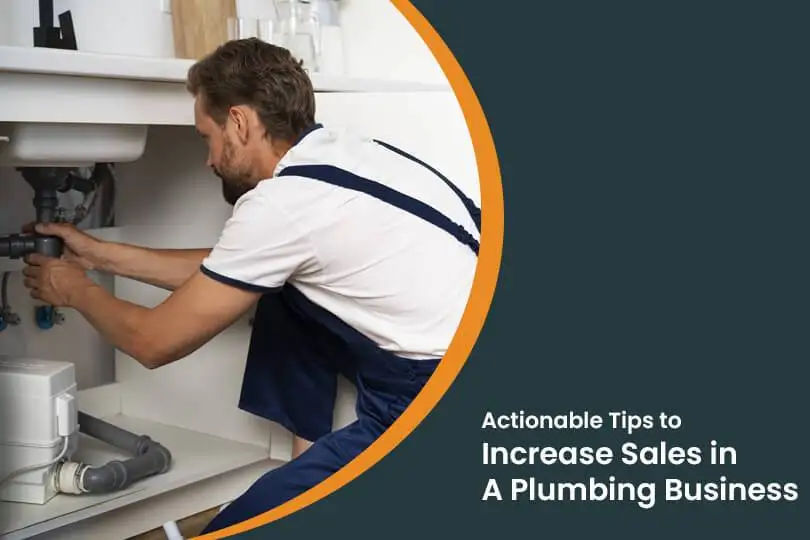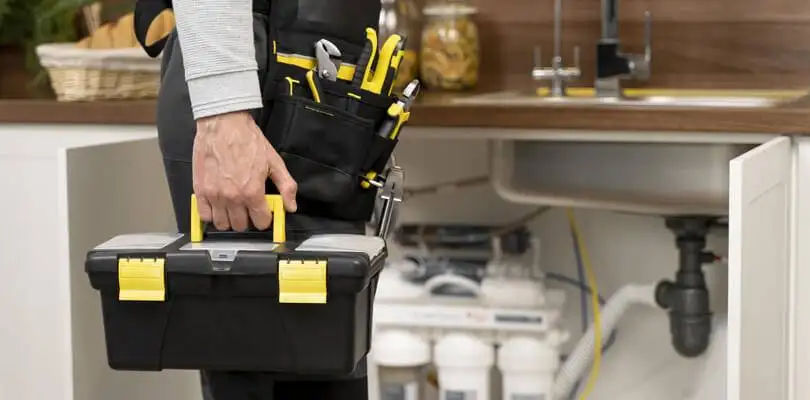9 Amazing Tips to Boost Sales in Plumbing and Heating Service Businesses

How do leading plumbing and heating companies keep up their sales?
This is a question that every small plumbing business owner keeps pondering. Obviously, this is one of the most critical aspects of ensuring sustainability and success in business. Plumbing and heating services are always in high demand, given how essential they are for modern living. As a result, more and more plumbing companies are being launched every day to get a piece of the profit, making this industry highly competitive. Under such conditions, it is not easy to increase, or even keep up, the sales numbers for a small plumbing business.
Ready to get started with Field Promax?
Sign Up FreeIn light of the steep competition and highly dynamic nature of the plumbing and heating industry, it is essential for small plumbing companies to have a comprehensive sales strategy to navigate the competitive landscape, overcome challenges, and drive business growth. A well-defined sales strategy provides direction and focus, enabling companies to identify target markets, differentiate themselves from competitors, and articulate their unique value proposition to potential customers.
By outlining clear objectives, sales tactics, and performance metrics, a comprehensive sales strategy empowers small plumbing and heating businesses to allocate resources effectively, optimize sales processes, and maximize revenue generation. Moreover, a strategic approach to sales fosters consistency, accountability, and continuous improvement, ultimately positioning companies for long-term success.
Despite its significance, small plumbing businesses often struggle to develop a comprehensive sales strategy. If you too are in the same boat, we are here to help you! In this blog, we will guide you through the most effective ways of selling a plumbing business. Just follow the tips, and soon you will find your numbers soaring.
Challenges Faced by Small Plumbing Companies in Sales

1. Intense Competition
The plumbing and heating service industry is highly competitive, especially at the local level where small companies operate. With numerous competitors offering similar services, small plumbing businesses struggle to stand out and differentiate themselves, making it challenging to capture market share and secure new customers.
2. Limited Brand Recognition
Compared to larger, established firms, small plumbing and heating companies often have limited brand recognition and reputation. Building trust and credibility with potential customers becomes more difficult when competing against well-known brands, leading to longer sales cycles and lower conversion rates.
3. High Customer Expectations
Customers have high expectations when it comes to plumbing and heating services, particularly in terms of responsiveness, reliability, and quality of work. Small companies may face challenges meeting these expectations consistently, especially during peak demand periods or when resources are stretched thin.
4. Complex Sales Process
Sales in the plumbing and heating industry can be complex, involving detailed assessments, customized solutions, and accurate cost estimates. Small companies may lack the resources or expertise to navigate this process effectively, leading to missed opportunities or lost sales.
5. Limited Resources
Small plumbing and heating businesses often operate with limited resources, including budget constraints, manpower shortages, and technology limitations. These resource constraints can hinder sales efforts, such as investing in marketing campaigns, hiring dedicated sales staff, or implementing sales enablement tools, making it difficult to compete effectively with larger competitors.
6. Seasonal Fluctuations
The demand for plumbing and heating services can fluctuate seasonally, with peak periods during colder months and lulls during warmer seasons. Small companies may struggle to manage cash flow and maintain consistent sales volumes throughout the year, leading to financial strain and operational challenges.
7. Price Sensitivity
Customers in the plumbing and heating industry are often price-sensitive, seeking competitive quotes and bargaining for discounts. Small companies may find it challenging to compete on price alone while still maintaining profitability, especially when faced with larger competitors that can offer economies of scale and lower pricing.
8. Limited Marketing Resources
Marketing plays a crucial role in generating leads and driving sales for a small plumbing business. However, small businesses often have limited marketing resources, making it difficult to execute comprehensive marketing campaigns, build brand awareness, and reach target audiences effectively.
9. Customer Acquisition Costs
Acquiring new customers can be costly for small plumbing and heating companies, especially when factoring in marketing expenses, sales commissions, and time spent on prospecting. With limited resources and tight profit margins, small businesses must carefully balance customer acquisition costs with revenue generation to ensure sustainable growth.
Crafting a Tailored Sales Strategy for Small Plumbing and Heating Businesses
A plumbing business should have its own unique sales strategy tailored to its specific strengths, weaknesses, and market dynamics. While industry leaders may set benchmarks and provide insights into successful practices, blindly following their strategies may not yield the desired results for smaller plumbing businesses. Each plumbing company operates within a distinct market environment, serving unique customer segments with different needs and preferences. A customized sales strategy supported by a well-structured Plumbing Proposal Template, allows businesses to leverage their unique value proposition, brand identity, and competitive advantages to stand out from competitors and attract customers effectively.
Furthermore, industry leaders often have resources, scale, and brand recognition that smaller plumbing businesses may not possess. Therefore, strategies employed by these leaders may not be feasible or practical for smaller companies with limited budgets, manpower, and market reach. Instead, small plumbing businesses must develop their own sales strategies that align with their resources, capabilities, and growth objectives. By focusing on niche markets, emphasizing personalized service, and leveraging innovative marketing tactics, small plumbing businesses can carve out a distinct competitive position and achieve sustainable growth in the industry.
Developing a Sales Strategy: Its Significance
1. Increased Customer Acquisition
A well-defined sales strategy enables plumbing and heating companies to proactively identify and target potential customers, leading to higher conversion rates and increased customer acquisition. By understanding customer needs, pain points, and preferences, companies can tailor their sales approach to effectively communicate value propositions and win new business.
2. Improved Customer Retention
A sales strategy focused on building long-term customer relationships enhances customer retention rates for plumbing and heating companies. By nurturing existing client relationships through regular communication, follow-ups, and personalized service, companies can strengthen customer loyalty and encourage repeat business.
3. Optimized Resource Allocation
Having a sales strategy allows a small plumbing business to allocate resources—such as time, manpower, and budget—more effectively. By prioritizing high-value prospects, targeting specific market segments, and streamlining sales processes, companies can optimize resource utilization and maximize return on investment (ROI).
4. Competitive Advantage
A sales strategy that emphasizes differentiation and value proposition helps plumbing and heating companies stand out from competitors in the market. By highlighting unique selling points, such as expertise, service quality, or pricing models, companies can differentiate themselves and position themselves as preferred partners for customers.
5. Business Growth and Expansion
A structured sales strategy lays the groundwork for sustainable business growth and expansion opportunities for a plumbing business. By setting clear growth objectives, identifying new market opportunities, and implementing scalable sales processes, companies can capitalize on growth prospects and expand their market presence over time.
Ready to get started with Field Promax?
Sign Up FreeEssential Components of an Effective Sales Strategy
1. Target Market Identification
Clearly define the target market segments based on factors such as geographic location, customer demographics, and service requirements. Understanding the needs and preferences of target customers is crucial for tailoring sales efforts effectively.
2. Value Proposition Development
Develop a compelling value proposition that articulates the unique benefits and solutions offered by the plumbing business. Highlighting key differentiators such as expertise, reliability, or competitive pricing helps position the company effectively in the market.
3. Lead Generation Strategy
Implement a lead generation strategy to identify and attract potential customers. This may include tactics such as networking, referrals, digital marketing, and direct mail campaigns to generate a steady stream of qualified leads for the sales team to pursue.
4. Sales Process Definition
Define a structured sales process outlining the steps involved, from lead qualification to closing the sale. This includes lead qualification criteria, sales presentation techniques, objection-handling strategies, and negotiation tactics to guide sales representatives through the customer journey.
5. Customer Relationship Management (CRM) System
Implement a CRM system to manage customer interactions, track sales activities, and maintain a centralized database of prospects and clients. A CRM system streamlines sales processes, facilitates communication, and enables data-driven decision-making to drive sales effectiveness.
6. Sales Team Training and Development
Provide comprehensive training and ongoing development opportunities for the sales team to enhance their skills, product knowledge, and sales techniques. Investing in continuous training ensures that sales representatives are equipped to handle customer inquiries, overcome objections, and close deals effectively.
7. Performance Measurement and Analysis
Establish key performance indicators (KPIs) to measure the effectiveness of the sales strategy and track progress towards sales goals. Regularly analyze sales performance data, identify areas for improvement, and adjust the sales strategy accordingly to optimize sales effectiveness and drive business growth.
Tips to Boost Sales in Your Plumbing Business

At this point, hopefully you have understood the importance of having a robust sales strategy and its essential components. Now, let’s delve into the question business owners have been pondering for ages—how to sell plumbing services to more customers.
As we have already mentioned, the plumbing industry is highly competitive. No matter what specific service you provide, there are other businesses offering similar services to the same pool of customers. In that case, how do you ensure that your target customers choose your brand over your competitors? Simple! Just follow these nine tips:
1. Offer Maintenance Subscription Plans
Introduce maintenance subscription plans that provide customers with regular servicing and check-ups for their plumbing and heating systems. These plans not only generate recurring revenue but also foster long-term relationships with customers, leading to increased loyalty and word-of-mouth referrals.
2. Leverage Local Partnerships
Forge partnerships with local home improvement stores, real estate agencies, and property management companies to gain access to a broader customer base. Offering exclusive discounts or joint promotional events can help attract new customers and establish credibility within the community.
3. Invest in Online Reviews and Testimonials
Encourage satisfied customers to leave positive reviews and testimonials on popular review platforms and social media channels. Positive online reviews serve as powerful endorsements and can influence potential customers’ purchasing decisions, boosting credibility and attracting new business.
4. Create Educational Content
Develop informative content, such as blog posts, how-to guides, and instructional videos, that address common plumbing and heating issues and provide helpful tips for homeowners. Sharing valuable knowledge establishes the company as an authority in the field and builds trust with potential customers, leading to increased inquiries and sales.
5. Offer Financing Options
Provide flexible financing options, such as installment plans or low-interest loans, to make your services more accessible to customers with budget constraints. Offering convenient payment solutions can help overcome price objections and incentivize customers to proceed with larger projects or upgrades.
6. Implement Referral Programs
Launch referral programs that reward existing customers for referring new business to the company. Offer incentives such as discounts, gift cards, or free service visits for each successful referral, motivating satisfied customers to advocate for your services and drive sales through word-of-mouth referrals.
7. Utilizing Local SEO Strategies
Neglecting local search engine optimization (SEO) can be a costly mistake for a small plumbing business. Optimizing the company’s website for local search terms, such as “plumber near me” or “emergency plumbing services [city],” can significantly increase visibility among local customers actively seeking plumbing services. By ensuring accurate business listings on online directories, claiming Google My Business profiles, and obtaining positive reviews from satisfied customers, plumbing companies can enhance their local SEO presence, attract more qualified leads, and ultimately boost sales within their target geographic area.
8. Embrace Eco-Friendly Solutions
Highlight eco-friendly plumbing and heating solutions, such as energy-efficient appliances, water-saving fixtures, and renewable heating systems, to appeal to environmentally conscious customers. Positioning the company as environmentally responsible can attract a niche market segment and differentiate it from competitors.
9. Utilize Geotargeted Advertising
Implement geotargeted advertising campaigns on digital platforms such as Google Ads and social media to reach customers within specific geographic areas. Targeting ads to local neighborhoods or regions increases visibility among potential customers seeking plumbing and heating services in their vicinity, resulting in higher conversion rates and sales opportunities.
Bonus Tip: Leverage Plumbing Business Software to Boost Sales

While these nine tips will help you see a significant rise in your sales numbers, they will require some time to yield the desired results. But if you want a faster result when it comes to increasing sales, we have a more effective solution for you—just sign up for plumbing business software.
A plumbing business software system is essentially a type of field service management software specifically designed for plumbing and heating companies. It offers numerous features and functionalities that can significantly contribute to boosting sales and increasing revenue for plumbing and heating businesses. Firstly, by streamlining operational processes such as job scheduling, dispatching, and inventory management, the software improves overall efficiency and enables technicians to complete more jobs in less time. This increased productivity allows businesses to take on more service requests, handle higher work volumes, and capitalize on additional revenue-generating opportunities. Moreover, plumbing software often includes built-in customer relationship management (CRM) tools that enable businesses to maintain detailed customer records, track service histories, and personalize interactions. By leveraging these CRM capabilities, plumbing and heating businesses can enhance customer satisfaction, foster loyalty, and generate repeat business, ultimately leading to increased revenue over time.
Furthermore, plumbing business software facilitates better decision-making and resource allocation through real-time data analytics and reporting functionalities. By analyzing key performance metrics such as technician productivity, job completion times, and customer satisfaction scores, businesses can identify areas for improvement, optimize service delivery processes, and allocate resources more effectively. Additionally, field service management software enables businesses to identify upselling and cross-selling opportunities during service visits by providing technicians with access to customer information, service histories, and product catalogs. By empowering technicians to make informed recommendations to customers based on their specific needs and preferences, businesses can increase sales of additional services, products, or upgrades, ultimately driving revenue growth for the company.
In Conclusion
When it comes to increasing sales, Field Promax stands out as the optimal choice for a small plumbing business seeking to enhance sales and drive revenue growth due to its combination of user-friendly features and flexible pricing options tailored to companies of all sizes. With its intuitive interface and straightforward navigation, Field Promax ensures ease of use for technicians, dispatchers, and administrators alike, minimizing training time and maximizing productivity from day one. This simplicity extends to every aspect of the software, from job scheduling and dispatching to invoicing and payment processing, streamlining operations, and enabling teams to focus on delivering exceptional service to customers. Additionally, Field Promax offers flexible pricing plans that cater to the diverse needs and budgets of plumbing businesses, whether they are small, medium, or large enterprises. With options for pay-as-you-go pricing or monthly subscriptions, companies can scale their usage according to their requirements, avoiding unnecessary costs and ensuring a cost-effective solution that grows with their business.
Furthermore, Field Promax provides a comprehensive suite of features designed specifically for the plumbing industry, empowering businesses to optimize sales processes, increase service efficiency, and drive revenue generation. From lead management and customer relationship management (CRM) to job tracking and inventory management, Field Promax offers all the tools necessary to streamline operations and capitalize on sales opportunities. Additionally, its robust reporting and analytics capabilities enable businesses to gain valuable insights into performance metrics, identify areas for improvement, and make data-driven decisions that drive revenue growth. Overall, with its user-friendly interface, flexible pricing options, and tailored features for plumbing businesses, Field Promax emerges as the best choice for companies looking to boost sales and increase revenue while enhancing overall operational efficiency.
For more information, contact Field Promax
We're here to help you get started